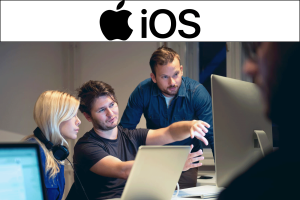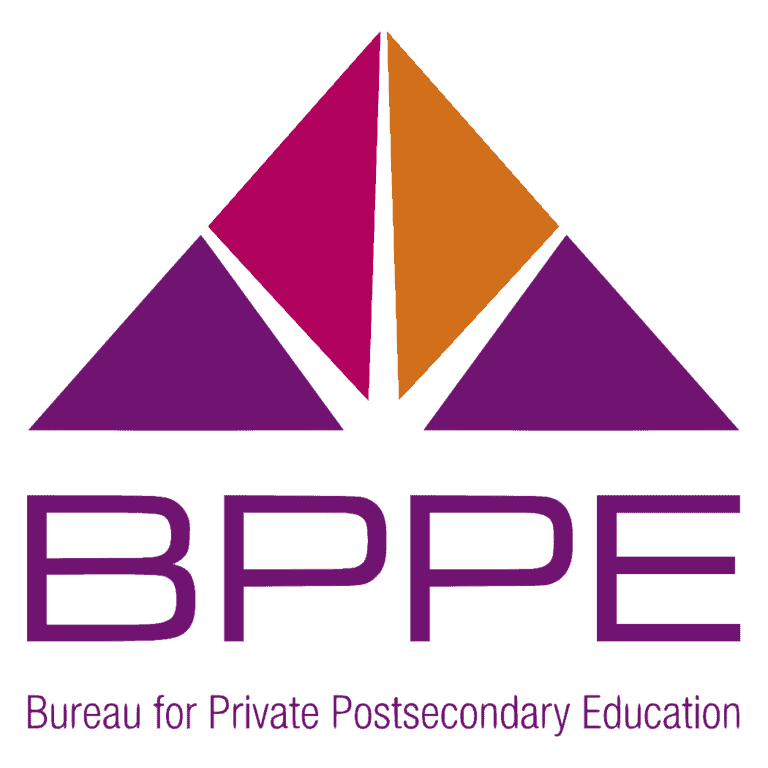Get the Skills to Become an Apple iOS App Developer

30-Week* Mobile Development Immersive 1 (MDI-1) Program
Apple iOS App Developers specialize in designing and building applications for Apple’s iOS operating system, which runs on devices like the iPhone, iPad, and iPod Touch. Whether working as a freelancer for a software company or within a specific industry, Apple iOS App Developers play a crucial role in creating the apps that people use on their Apple devices every day.
The Mobile Development Immersive 1 (MDI-1) program is intended to unlock the potential of mobile technology with a comprehensive focus on Apple iOS mobile software, applications, and programming languages.
Next Start Date: Feb 9thMobile Development Immersive 1 (MDI-1) San Diego Global Knowledge University - San Diego Campus 1095 K Street, Suite B San Diego California USA 92101 The Mobile Development Immersive 1 program provides you with the skills and experience needed to design, develop, and deploy innovative apps for millions of iOS users worldwide.https://sdgku.edu/wp-content/uploads/2025/03/web-design-dev-border.pngSan Diego Global Knowledge University
The best way to see if San Diego Global Knowledge University is the right fit for you is to book an Admissions Appointment. You’ll meet with an Admissions Representative who will give detailed program and schedule information. Book an Admissions Appointment or Get more info.
Becoming a Skilled Apple iOS App Developer
Designed for aspiring software engineers and tech enthusiasts, the Mobile Development Immersive 1 program provides an in-depth exploration of iOS app development, equipping you with the skills needed to create innovative and user-friendly applications for iPhones, iPads, and wearables.
With over 1.5 billion active Apple devices worldwide, the demand for skilled iOS developers is higher than ever. By mastering iOS development, you will position yourself at the cutting edge of technology, opening doors to potentially lucrative career opportunities and the ability to make a significant impact in the tech industry.
Get Program Details Now!Apply Online
Is an Apple iOS Mobile Development Course Right For You? Find Out! Take the SDGKU “Career Training Readiness Quiz”
This fun, online quiz takes 3 minutes to complete and you'll get a personalized report. Identify your strengths and social style plus the training and positions you're best suited for. Get Your Career Training Readiness Score Now >>
Federal Financial Aid
If you qualify for funding, you may be entitled to government grants (free money) and loans, available at the best rates possible. Learn More
Career Opportunities
As a graduate of the Mobile Development Immersive 1 program, career opportunities include:
- iOS App Developer
- Mobile App Developer
- UI/UX Designer
- Software Engineer
- Quality Assurance Engineer
- Freelance App Developer
100% Online and Hybrid Options Available
Our program is designed to fit the needs of busy, adult learners, so you can choose between our 100% online or hybrid learning option. Many of our students are raising families and some continue to work while going to school. We will help you choose a schedule that works for you.
- Apply fundamental and intermediate programming principles to develop and optimize applications using Swift, SwiftUI, and version control techniques.
- Implement intuitive and efficient mobile application interfaces using SwiftUI.
- Apply programming languages and tools for iOS to create mobile applications.
- Demonstrate the use of testing and debugging in mobile applications to ensure functionality, reliability, and performance.
- Implement mobile applications on app stores while managing updates effectively.
Students enrolled in this non-degree program must achieve a minimum cumulative grade point average (CGPA) of 2.0 to graduate. Applicants for this non-degree program must submit the following documents:
1. The corresponding SDGKU online Application for Admission and supporting documents; and
2. Official transcripts of record from a high school recognized by the United States Department of Education or equivalent, including established foreign high schools, if the institution offering the program documents that its minimum required courses of study, units and content rigor are the same as those of a high school from an institution approved by the United States Department of Education.
30 weeks* or 24 semester credit hours.
Textbook Costs & ISBNs: View Document
Details
- This program is offered in both online and hybrid options.
- There is no difference in cost between the two options and there are no additional associated costs for taking the hybrid option.
- The curriculum for both options is the same in terms of academic requirements.
- The hybrid option is offered to students who would prefer to attend in-residence sessions periodically.
- Non-local students are responsible for their own travel expenses and lodging.
- There are NO textbook costs for this program (Estimated, purchased by students from publishers or re-sellers)
Modalities
Online students study and attend class remotely for 100% of their curriculum, while hybrid students are required to both study online and attend in-residence sessions offered at the SDGKU campus.
Scheduling
In-residence sessions are scheduled prior to start date of a program or course.
Enrollment
If you are interested in enrolling in a hybrid program, please reach out to our admissions representatives for details on scheduled in-residence sessions dates and times.

Lead Faculty: Sergio Inzunza, Ph.D.
Dr. Inzunza is a Full Stack Development Immersive professor, as well as Mobile Development Immersive 1 and 2 professor and lead faculty. He has over a decade of experience teaching software development and software engineering courses to bachelor’s-level students and professional development cohorts. He has extensive professional experience in the field of software engineering, having worked at various levels of software development for more than 15 years. Dr. Inzunza holds a Bachelor’s degree in Software Engineering, a Master’s degree in Computer Science, and a Ph.D. in Software Engineering from Universidad Autónoma de Baja California. His research areas include Software Engineering, Human-Computer Interaction, and Recommender Systems. He has published multiple research papers in international peer-reviewed journals. The aforementioned foreign academic degrees have been evaluated and recognized as equivalent to U.S. degrees.
In addition to his academic qualifications, Dr. Inzunza brings a robust professional background in the software development industry. He has held roles as a front-end, full stack, and mobile developer at Senior and Lead Engineer levels, contributing to high-impact projects at several multi-billion-dollar companies. His industry experience spans large-scale web and mobile applications, agile team leadership, and mentoring junior developers. This unique combination of academic rigor and practical expertise positions Dr. Inzunza to lead and inspire students in both the theoretical and applied aspects of software engineering.
Course Descriptions
In this course, students will explore the iOS ecosystem and learn the fundamental concepts required to develop Apple applications. They will begin with an introduction to essential tools like Xcode and the Swift programming language, followed by the fundamentals for designing interfaces using the SwiftUI framework.
(1 credit hour)
This course introduces students to fundamental programming concepts using the Swift programming language. Students will explore key programming paradigms, including imperative, object-oriented, and declarative programming. The course also covers object-oriented programming, focusing on classes and objects, as well as declarative programming principles for building user interfaces. By the end of the course, students will have a solid foundation in the core concepts of programming and be prepared to apply these concepts in an application.
(1 credit hour)
This course builds on foundational programming concepts, guiding students through intermediate-level applications using the Swift programming language. Students will learn data structures like arrays and dictionaries and explore advanced object-oriented programming concepts such as inheritance. Additionally, the course emphasizes declarative programming practices for user interface development and introduces version control systems to manage and track changes in code. By the end of the course, students will have the skills to develop more complex applications.
(1 credit hour)
This unit focuses on the fundamental principles of User Interface (UI) and User Experience (UX) design for iOS applications, following Apple’s design guidelines. Students will learn how to create intuitive, user-centered interfaces that prioritize usability, accessibility, and consistency. Additionally, they will gain hands-on experience using a dedicated application to design wireframes and prototypes, applying design principles to develop functional and visually appealing interfaces following Apple’s design guidelines.
(1 credit hour)
This unit covers the practical implementation of User Interface (UI) and User Experience (UX) design principles for iOS using the SwiftUI framework. Students will translate their wireframes and prototypes into fully functional user interfaces, leveraging SwiftUI’s declarative syntax. The focus is on applying Apple’s Human Interface Guidelines to create seamless, interactive, and accessible user experiences in iOS applications.
(1 credit hour)
This unit focuses on the advanced implementation of UI/UX in iOS applications using SwiftUI. Students will learn to create engaging and dynamic user experiences by designing animations, transitions, and complex layouts. Emphasis will be on building smooth, responsive interactions and visually appealing interfaces, applying best practices to ensure performance and usability.
(1 credit hour)
This course focuses on the essential skills for testing and debugging iOS applications developed with SwiftUI. Students will learn how to implement unit tests, UI tests, and use debugging tools within Xcode to identify and resolve errors. Emphasis is placed on maintaining code quality, improving app performance, and ensuring that the user interface functions as expected.
(1 credit hour)
This unit teaches essential skills for implementing data persistence in iOS applications developed with SwiftUI. Students will learn to define models and explore techniques such as UserDefaults, Core Data, and file storage to ensure app data remains accessible across sessions, contributing to a seamless user experience. The course emphasizes best practices in managing local data storage efficiently, with a focus on app performance and user experience.
(1 credit hour)
This course immerses students in the sophisticated realm of networking and web services within iOS applications using Swift and SwiftUI. Learners will acquire essential skills to architect robust and secure connections between applications and web APIs, facilitating seamless data exchange. Through practical engagement, students will master URL sessions, asynchronous data handling, and data parsing with Codable, enabling the efficient retrieval, transmission, and processing of web-based information. Emphasis is placed on industry best practices for network security, error management, and optimizing performance in applications reliant on networked data.
(1 credit hour)
This foundational unit delves into the integration and utilization of smartphone sensors within iOS applications, focusing on building responsive, context-aware experiences using SwiftUI. Students will explore methods to access and manage data from key sensors, including the camera, GPS, accelerometer, gyroscope, and health-related sensors, transforming raw data into actionable insights. Emphasis is placed on real-time data processing, safeguarding user privacy, and implementing best practices for managing sensor inputs. Through practical exercises, learners will develop the skills to create applications that interact intuitively with the physical environment, enhancing the user experience.
(1 credit hour)
This intermediate-level unit advances students’ capabilities in utilizing iOS device sensors, enabling the development of sophisticated, sensor-driven applications. Building on foundational knowledge, students will learn to harness the power of Core Motion, Core Location, HealthKit, and camera functionalities to create responsive, real-time applications. The course emphasizes combining multiple sensor inputs to build dynamic, context-aware experiences that provide users with instant feedback based on their movements, surroundings, and health data. Through practical projects, students will refine their skills in managing complex sensor data and optimizing app performance for a seamless user experience.
(1 credit hour)
This introductory course guides students through the design and development of mobile applications tailored for wearable devices, such as smartwatches. Learners will tackle the unique challenges of creating user interfaces for smaller screens and managing interactions within limited spaces. The course emphasizes leveraging wearable sensors, including heart rate monitors and motion detectors, to build responsive, real-time applications that enhance user experiences in fitness, health tracking, and activity monitoring. Through practical exercises, students will learn to optimize app performance, manage sensor data, and create intuitive, user-friendly interfaces that prioritize simplicity and usability on wearable devices.
(1 credit hour)
This intermediate course delves into developing sophisticated, interactive applications for wearable devices with iOS technologies. Building on foundational knowledge, students will learn to design applications that incorporate advanced movement tracking, real-time health monitoring, and media capture, maximizing the capabilities of wearable sensors. Emphasis is placed on efficient sensor data management and synchronization, enabling seamless communication and interaction between wearable devices and iPhones. The course also covers contextual notifications and feedback loops to enhance user engagement, ensuring applications remain responsive and power-efficient in wearable environments.
(1 credit hour)
This course focuses on building applications for iPadOS and exploring the capabilities of this platform. Students will learn how to design and adapt iPad applications that take advantage of the screen size, multitasking capabilities, and advanced gestures. The course covers the best practices for creating adaptive user interfaces and utilizing the full power of iPad hardware for complex tasks.
(1 credit hour)
In this course, students will explore the principles and practices of localization and internationalization in iOS applications. The course covers how to adapt iOS apps to support multiple languages, regions, and cultural contexts, using the built-in tools provided by the iOS development environment. Students will learn best practices for managing localized strings, handling different date and number formats, and supporting right-to-left (RTL) layouts. Additionally, the course covers testing localized apps and ensuring a consistent user experience across diverse markets. By the end of the course, students will be able to internationalize and localize their iOS apps, offering a seamless experience to users worldwide.
(1 credit hour)
In this course, students will learn the complete process of deploying iOS applications and submitting them to the Apple App Store. The course covers essential topics such as preparing apps for release, creating distribution certificates, signing and packaging apps, and optimizing apps for various devices. Students will explore the App Store submission process, including creating app listings, managing metadata, setting pricing, and ensuring compliance with Apple’s guidelines and policies. By the end of the course, students will be proficient in deploying production-ready iOS apps and successfully publishing them on the App Store.
(1 credit hour)
In this course, students will explore the principles and techniques of automated testing in iOS app development. The course covers various types of automated tests, including unit testing, UI testing, and integration testing, using popular frameworks like XCTest and XCUITest. Students will also learn about test-driven development (TDD), continuous integration (CI), and best practices for maintaining robust and efficient test suites. By the end of the course, students will be able to implement comprehensive automated testing strategies that ensure the quality, stability, and performance of iOS applications.
(2 credit hours)
In this course, students will initiate their capstone project, synthesizing the knowledge and skills acquired throughout the iOS Developer Program. The focus will be on planning and designing a comprehensive iOS application. Students will begin by conceptualizing an app idea, followed by conducting requirements analysis, designing user interfaces, and creating detailed project plans. By the end of this course, students will have a complete blueprint for their application, ready to proceed to development.
(2 credit hours)
In this course, students will begin developing their capstone project by implementing the core functionalities of their iOS application. Emphasis will be placed on applying programming fundamentals, integrating user interface designs, and setting up data persistence mechanisms. By the end of this course, students will have a functional prototype that demonstrates the basic features of their application.
(2 credit hours)
In this final course, students will complete their capstone project by refining their application, implementing advanced features, and preparing it for deployment. Focus will be on optimizing performance, conducting thorough testing, and finalizing documentation. By the end of this course, students will have a polished, fully functional iOS application ready for presentation and potential submission to the App Store.
(2 credit hours)
Is a Career as an Apple iOS App Developer Right for You? Get More Info…
If you’re interested in learning more about careers in Apple iOS App Development and exploring whether San Diego Global Knowledge University is right for you, fill out the form on this page to receive more information.
For immediate questions, call (619) 934-0797.
*Program length when completed in normal time.



